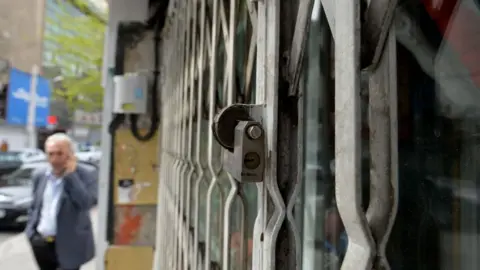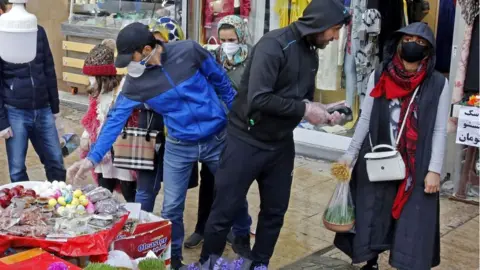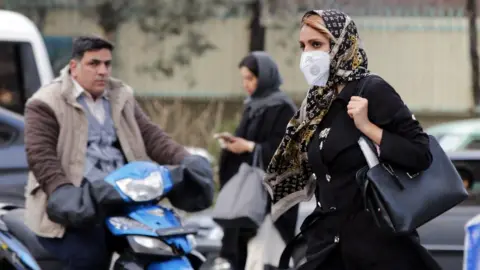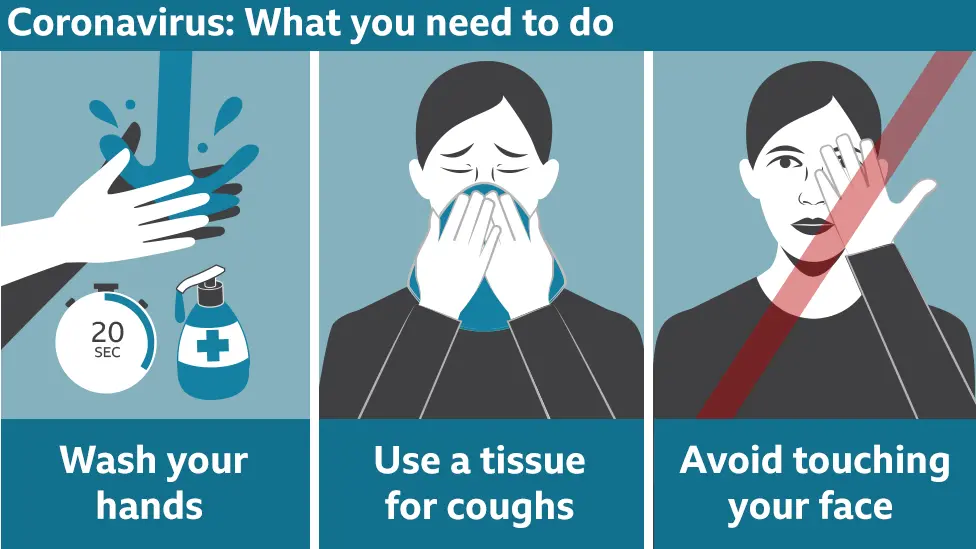Coronavirus: Iran is facing a major challenge controlling the outbreak
Iran's leadership has widened restrictions on travel and banned traditional gatherings as the death toll there continues to rise.
So what measures have now been taken to try to stop the spread of the virus in Iran?
New Year holiday restrictions
During the Nowruz festival celebrating the Persian New Year which lasts until 3 April, people usually flock to tourist destinations such as the Caspian Sea for family holidays.
They have continued to do so despite the restrictions in place on journeys out of towns and cities.
"Unfortunately some Iranians have ignored advice from health ministry officials and travelled during the New Year holidays ... This could cause a second wave of the coronavirus," said government spokesman Ali Rabiei.
Allow X content?
Photos have been shared on social media showing traffic jams on the main road between the capital, Tehran, and the religious centre of Qom.
President Rouhani has said gatherings are also to be restricted during Sizdah Bedar on April 1, a nature festival during which Iranians traditionally have picnics outdoors.
Shops, shrines and schools closed
Iran's President Rouhani ordered shopping centres and bazaars across the country to shut for the 15-day holiday. The only exceptions are for pharmacies and grocery stores.
 Getty Images
Getty ImagesThe authorities have also closed key religious sites, among them the highly-revered shrines of Hazrat Masoumeh and Imam Reza in the cities of Qom and Mashhad.
The government came under severe criticism when it had earlier chosen not to close the shrine in Qom, the holy city at the centre of the outbreak, visited by millions of Shia Muslim pilgrims every year.
"We should have quarantined Qom from day one... this disease is not a joke, which is the way we are dealing with it," the vice-speaker of Iran's parliament and former Health Minister Massoud Pezeshkian said.
Despite its shrine being closed, Mashhad has experienced an influx of visitors during the holiday period. The city's mayor has warned of a looming "human catastrophe" and has criticised the government's decision not to lockdown the city ahead of the holiday period
Although the government has closed schools, universities and shrines, and banned cultural and religious gatherings, it has not imposed complete lockdowns so far.
 Getty Images
Getty ImagesPresident Rouhani has also announced economic measures designed to ease the pressure on families and businesses. These include postponing health insurance, tax and utility bill payments for the next three months.
The government has said that it will give cash payments to the three million poorest Iranians while another four million households will receive low-interest loans, partly subsidised by the government.
Have US sanctions had an impact?
Critics say the Iranian government should have taken tougher measures earlier on to tackle the spread of the coronavirus.
However, Foreign Minister Mohammad Javad Zarif has said that Iran's healthcare has been compromised due to the sanctions imposed by the US.
 EPA
EPAMr Zarif says they have "drained Iran's economic resources."
The US has denied that its sanctions are restricting Iran's ability to import medical supplies, pointing to an exemption for humanitarian goods.
But Iran says companies find it difficult to process payments with banks unwilling to risk breaking US rules and risk sanctions themselves.
The government says it's approaching the International Monetary Fund (IMF) for emergency assistance amounting to $5bn.
The World Health Organization (WHO) has sent Iran diagnostic kits, protective equipment and medicine in a number of shipments since the first Covid-19 case was reported there in February.
A WHO team which visited Iran in early March said although progress had been made in expanding testing and in other areas, more work needed to be done.

- LATEST: Live coverage of developments
- EASY STEPS: What can I do?
- A SIMPLE GUIDE: What are the symptoms?
- MAPS AND CHARTS: Visual guide to the outbreak
- VIDEO: The 20-second hand wash

Many countries, including China, Turkey, Germany, France, UK, Japan, Qatar, the UAE, Uzbekistan, Azerbaijan, and Russia have sent aid packages.
As in other countries with outbreaks, Iranians have been queuing up at pharmacies to purchase medical masks as well as disinfectant gels and sprays.
Prices of these products, where they're available at all, have gone up by as much as ten times.
Some on social media have claimed the reason behind the lack of availability of masks is due to the fact that millions were donated to China earlier.
There were also reports that Chinese companies have bought huge quantities of masks from Iran creating a shortage in the domestic market.
The Iranian government has now banned the export of face masks and ordered factories to ramp up production.





